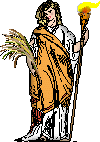|
|
|
 Hellenic Paganism Explained & Explored
Hellenic Paganism Explained & Explored 

Welcome to my site. On these pages I will attempt to explain some of the basic beliefs and practices of Hellenic Paganism (aka. Hellenic Polytheism, Hellenism, Hellenismos and Greek Paganism). I will also try to include some resources for new and old practitioners alike, as well as some reading lists and critical thinking essays to keep the mind (Hellenic or otherwise) sharp and in full gear. As an obligatory bit of false modesty, I must say that this site is new and its mission rather large in scale, so it will take time for me to write essays and gather information--so be patient and sweet and all that other good stuff. If you want to know more about me, visit my personal homepage or send me an email.
Hellenic Paganism Defined
Hellenic Paganism (aka. Hellenismos) is the religion of the ancient Greeks, which has seen a revival in recent years. Practitioners are called Hellenes (Hell-eens), Hellenic Pagans, Hellenic Polytheists or Hellenists. We worship the ancient gods of Hellas (Greece) whom we believe to be very real and alive. We do not see the gods as "aspects" or archetypes of a larger creative force (as do many modern Pagan religions), but rather as individual and real beings, far more highly evolved than humans but still subjct to the laws and whim of the Cosmos (the One, which is impersonal and eternal and shall be discussed at length later). Our primary values, based on the Delphic Maxims, include Piety, Moderation and Self-Control. Rev. Drew Campbell, one of the most important Hellenic Pagan authors, has composed a brief FAQ to answer some common questions.
Hellenism is a Reconstructionist Pagan religion, which means that we attempt to preserve as many ancient elements as possible and use history and mainstream scholarship as our primary sources. This does not mean that we simply copy what the ancients did, nor does it mean that we don't modernize and innovate where necessary. While ancient Greek culture fascinates us and we admire it's good points, we focus primarily on the religion and do not include ancient cultural practices that we find irrelevent or offensive to modern progressive values (slavery, misogynism, and discrimination of any sort are generally frowned upon by modern Hellenes).
Hellenism is not eclectic, in that we do not combine pantheons or traditions to form a new tradition (as do many other modern Pagans), but is synchronistic, in that "foreign" deities or practices are often incorporated into our practice. To make the difference more clear, an eclectic worshipper might combine aspects of Christianity and Buddhism into their own personal religious path, whereas a synrhonistic worshipper might be a Christian who practices Buddhist meditation, or a Buddhist who meditates on the rosary. This means that, in addition to "foreign" gods and practices incorporated into the ancient Greek religion (Isis, an Egyptian Goddess, for example, was worshipped by many Greeks as well), modern Hellenes may honor other gods or use a variety of religious and spiritual practices if they feel that such practices are appropriate and helpful to them.
Many people wonder if they must be Greek to be a Hellene. In short, the answer is no. Hellenic Paganism is (in the words of Rev. Drew Campbell) "culturally specific," in that specific ancient gods are worshipped in the way that was traditional for that culture, but it is not "ethnically exclusive." There are many reasons for this. First, anyone who spoke Greek and was willing to honor the gods was welcome to do so in ancient Greece. Secondly (and perhaps more importantly), ancient Greece was a huge empire which dominated large sections of Europe and the Middle and Near East, and later become a cornerstone for all of Western Civilization. Anyone who lives in a Western nation or in any nation that has been in some way touched by Western society may feel a strong connection to the ancient gods of Greece, and many perhaps feel that, somewhere between the glory of ancient Greece and modern times, Western Civilization took a serious wrong turn and needs to return to its spiritual roots.
If you live in or near Raleigh, North Carolina and wish to worship with a Hellenic group, you may consider joining Triangle Proto-Demos of Hellenion. This is a local congregation of Hellenion that I have recently started. I am devoted to creating a positive group enviornment for local Hellenes to worship and work together in and am currently training through Hellenion to become a legally ordained Theoros, which will allow our group to perform legal weddings and other ceremonies requiring government paperwork in the near future.
Links & Resources